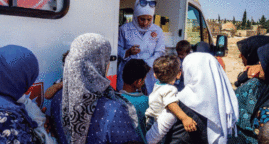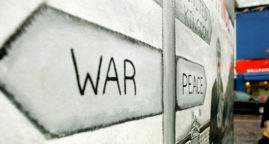Planning from the future : Is the Humanitarian System Fit for Purpose?
Article published on URD website on 02/01/2017
Four concerns explain the origins of the Planning from the Future project. The first is the increasingly accepted fact that, in the foreseeable future, humankind will be faced with unprecedented technological and societal change. These transformations may well have positive effects that will enhance the lives of a growing number of people around the world. At the same time, as with all such transformations, there, too, is a downside. That downside will be reflected in the vulnerabilities that are frequently concomitant with change. Hence, the second concern that led to the Planning from the Future project was the plausible prospect that the dimensions and dynamics of disasters and emergencies in the future will increase, perhaps even exponentially.
From this concern came the third. To what extent is the global community sensitive to such prospects? Beyond even those who are directly responsible for dealing with disasters and emergencies, is society more generally prepared to anticipate and mitigate the sources of future crisis drivers? Finally, this concern led to the more immediate issue that underpins the overall Planning from the Future project, namely what does the humanitarian sector’s past and present record suggest about its capacity for adjusting and responding to rapid, complex change in the future?
We, the Planning from the Future partnership, believe that these concerns in general, but more specifically the last, need wherever possible to be brought to the attention of all those who have roles and responsibilities for dealing with ever-more complex and uncertain disasters and emergencies. In no sense are we suggesting that the analysis that follows is definitive, but we are suggesting that a debate needs to be generated to test a proposition that has grave and, in a growing number of instances, existential humanitarian implications.
We would hope that in the aftermath of the World Humanitarian Summit, there will be increasing interest in testing the viability of the humanitarian community and the challenges that lie ahead. With that in mind, the partnership will maintain a website,planningfromthefuture.org, as one step towards promoting humanitarian futures-oriented discussion and debate. So, too, is the partnership committed to joining with others in a wide range of forums to present its findings and their implications.
As the acknowledgments above suggest, a broad spectrum of expertise was sought to develop this analysis. In many instances, that expertise has gone well beyond the confines of the humanitarian sector. It has involved the natural and social sciences, the private sector as well as the military, social networks and local communities – all to assess whether the past and the present should or should not be a guide to a humanitarian future. And, if the latter, what needs to be done to make the sector fit for the future?
This is the question that ultimately underpins the efforts of the Planning from the Future partnership.
Related Articles
Order of Malta in Hungary scaling up its assistance work to help Syrian population
12/27/2018. After nearly 8 years of war in Syria, the Order of Malta is still present in the region helping the local population with medical and humanitarian activities.
7 ways business can be agents for peace
05/28/2019. Recent research by the UN and the World Bank points to an urgent need for the international community to refocus on building peaceful societies and preventing violent conflict, which they calculate could save between $5 billion and $70 billion per year.
Malteser International | Syria’s War Children | No lost generation
06/20/2017. Syria’s War Children | No lost generation






